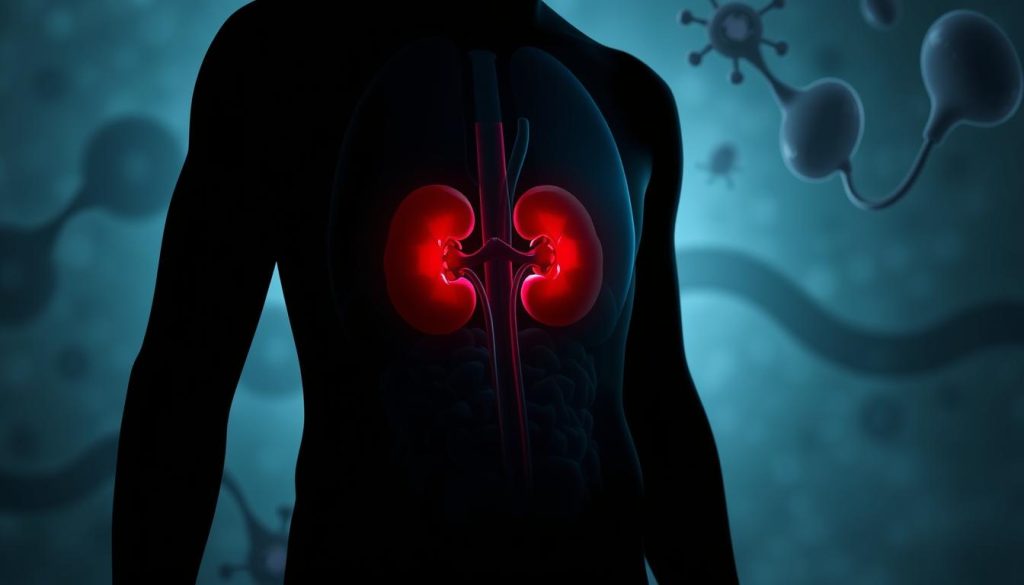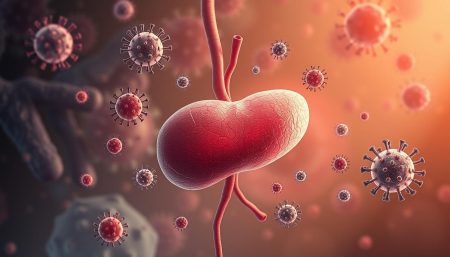Diabetic kidney disease is a big worry for millions with diabetes. It creates a web of problems that can change someone’s life a lot. This guide explores how high blood sugar affects the kidneys.
We aim to show how the kidneys are a key battleground in fighting diabetes complications.
This guide is packed with real stories, new research, and advice from doctors. It’s not just about medical terms. It’s a guide to help patients and their families understand the risks to kidney health.
It shows why managing diabetes well is so important for kidney health.
Understanding Diabetic Nephropathy
Diabetic nephropathy is a serious kidney problem caused by too much sugar in the blood. It affects how well the kidneys filter and clean the blood. Knowing about it is key to managing it well.
The Link Between Diabetes Mellitus and Kidney Problems
Diabetic nephropathy develops slowly. High blood sugar damages the kidneys’ filtering system. If not managed, this can lead to serious kidney issues. Keeping blood sugar levels in check is vital to prevent kidney problems.
Stages of Diabetic Kidney Disease
- Early Stage: Slight elevation in urine albumin and possibly normal kidney function.
- Moderate Stage: Increased albumin in urine, slight decrease in kidney function.
- Severe Stage: Significant albuminuria, noticeable reduction in glomerular filtration rate.
- End Stage: Kidney failure requiring dialysis or kidney transplantation to sustain life.
Risk Factors for Diabetic Nephropathy
- Hypertension: High blood pressure compounds the risk and accelerates the progression.
- Genetic Predisposition: A family history of diabetic kidney disease increases vulnerability.
- Uncontrolled Blood Sugar: Chronic high glucose severely damages renal tissues and functions.
Early Signs of Diabetic Kidney Disease
Spotting the early signs of diabetic kidney disease is key to avoiding kidney problems. This part talks about the main diabetic nephropathy symptoms. It also shows why regular checks are important for catching and treating the disease early.
Identifying Diabetic Nephropathy Symptoms
Diabetic nephropathy often starts without symptoms. But as it gets worse, small signs start to show. Catching these signs early is vital to stop kidney problems in diabetes. Common signs include:
- Swelling in the feet and ankles from fluid buildup
- Needing to pee more, often at night
- Feeling tired and weak all the time
- Foamy or frothy urine because of protein in it
Knowing and watching for these signs can help catch the disease early. This makes it easier to manage it.
The Importance of Regular Screening
Regular checks are key to avoiding kidney issues for people with diabetes. Doctors suggest doing certain tests regularly. These tests include:
| Test | Purpose | Frequency |
|---|---|---|
| Urine albumin test | To find early signs of protein in the urine, a sign of diabetic nephropathy | Annually |
| Estimated Glomerular Filtration Rate (eGFR) | To check how well the kidneys are working and the disease stage | At least once a year |
| Blood pressure check | To keep blood pressure low and protect the kidneys | At each healthcare visit |
Adding these tests to regular doctor visits can help find and treat diabetic nephropathy early. This stops kidney problems in diabetes.
Monitoring Kidney Function in Diabetes Patients
Managing diabetic kidney disease requires careful monitoring of kidney function. This helps catch problems early and tailor treatments to slow disease growth. Tests like the Glomerular Filtration Rate (GFR) and albuminuria are key. They show how well kidneys filter blood and handle proteins.
Understanding GFR and its Significance
The Glomerular Filtration Rate (GFR) is vital for checking kidney health in diabetes. It measures how kidneys filter small molecules like creatinine. A low GFR means kidneys aren’t working well, often due to diabetes.
Regular GFR tests are essential for diabetic patients. They help determine kidney disease stage and guide treatment.
Albuminuria Testing and What it Means
Albuminuria tests for albumin in urine, a sign of kidney damage. Albumin is a blood protein. Its presence in urine means kidneys are damaged. This test catches kidney damage early in diabetes patients.
Keeping albumin levels in check is key to preventing kidney function decline in diabetes.
Patient education is a big part of diabetes care. Teaching patients about these tests empowers them. It ensures they stick to monitoring schedules, vital for managing kidney disease.
New diagnostic technologies have made these tests more accurate and efficient. This helps in providing timely and tailored treatments.
Regular kidney function tests in diabetes patients are essential. They guide medication and diet adjustments, key to managing diabetes. This proactive approach helps prevent severe kidney disease outcomes.
Living with Diabetic Nephropathy
Living with diabetic nephropathy means making big lifestyle changes and watching what you eat. These steps are key to slowing the disease and keeping your kidneys healthy. It’s not easy, but knowing how these changes help makes them more important.
Dietary Adjustments for Kidney Health
Changing what you eat is very important for your kidneys. Experts say to eat less sodium and not too much protein. This helps your kidneys work less hard, which is good for managing the disease.
- Limit sodium intake to less than 2,000 milligrams per day.
- Monitor protein consumption, aiming for moderate levels as advised by a healthcare provider.
- Increase intake of fruits, vegetables, and whole grains that are low in phosphorus and potassium.
Following these dietary tips helps your kidneys and also improves your blood pressure and sugar levels. This is very important for people with diabetes.
Lifestyle Modifications to Slow Progression
Changing your lifestyle is also key in managing diabetic nephropathy. Quitting smoking and exercising regularly are big pluses.
- Quit smoking to improve renal and cardiovascular health.
- Engage in regular physical activity, such as walking or swimming, which helps manage blood sugar levels and reduces kidney stress.
Don’t forget about managing stress. Techniques like meditation or counseling are important for your mental health. This is vital when dealing with a chronic condition like diabetic nephropathy.
| Lifestyle Change | Benefits for Kidney Health |
|---|---|
| Reduced Sodium Intake | Decreases blood pressure levels, reducing kidney strain |
| Moderated Protein Consumption | Lessens workload on kidneys, slowing disease progression |
| Regular Physical Activity | Helps in weight maintenance and blood sugar level regulation, both critical for kidney care |
| Quitting Smoking | Improves renal and cardiovascular function, boosting overall health |
Medical Management of Diabetic Kidney Disease
Managing diabetic kidney disease effectively requires the right prescription drugs and new treatments. These options are constantly improving thanks to research and clinical trials. Knowing about them can greatly help patients and slow down kidney disease linked to diabetes.
Prescription Medications and Their Effects
Prescription drugs are key in fighting diabetic kidney disease. They mainly focus on lowering blood pressure and controlling blood sugar. This is vital for treating diabetic nephropathy.
ACE inhibitors and ARBs are very effective. They slow kidney damage and improve heart health. Also, Ozempic, a GLP-1 receptor agonist, helps manage diabetes. This indirectly helps the kidneys too.
Emerging Therapies in Nephropathy Management
New treatments for diabetic kidney disease are being developed. These new therapies show great promise in early trials. They aim to boost kidney function and offer benefits beyond what older treatments can.
Recent studies suggest non-steroidal mineralocorticoid receptor antagonists are promising. They protect the kidneys without the usual side effects of older treatments.
As research keeps advancing, it’s vital for patients and doctors to keep up. This way, they can make smart choices about adding new treatments to their care plan for diabetic kidney disease.
Treatment Options for Advanced Diabetic Kidney Disease
Diabetes can lead to kidney failure, needing more serious treatments. For those with advanced diabetic kidney disease, picking the right treatment is key. This section looks at dialysis and kidney transplants as main options.
When to Consider Dialysis
Dialysis is needed when kidneys can’t remove waste and water. Signs include low kidney function, high toxin levels, and symptoms like nausea and swelling. Patients can choose between hemodialysis and peritoneal dialysis based on their lifestyle and health.
Understanding Kidney Transplants
Kidney transplants are an option for severe kidney failure. To qualify, patients must be healthy enough for surgery. The transplant replaces the failing kidney with a new one, improving life quality and reducing dialysis needs.
| Treatment Type | Description | Benefits | Considerations |
|---|---|---|---|
| Hemodialysis | Using a machine to filter blood outside the body. | Efficient waste removal, several times a week. | Requires regular visits to a dialysis center. |
| Peritoneal Dialysis | Uses the lining of your abdomen to filter blood inside the body. | Can be done at home, more flexibility. | Needs daily intervention, risk of infection. |
| Kidney Transplant | Surgical replacement of the kidney. | Eliminates the need for regular dialysis, improves quality of life. | Requires finding a donor, risk of organ rejection. |
Knowing about these treatments offers hope and a plan for those with diabetes and kidney failure. Dialysis and transplants can help manage health and improve life quality, despite the challenges.
Preventing Renal Complications in Diabetes
Managing blood sugar and blood pressure is key to avoiding kidney problems in diabetes. Sticking to certain health goals can greatly lower the risk of serious kidney issues. We’ll explore how keeping blood glucose and blood pressure in check is essential for kidney health in diabetics.
Role of Blood Sugar Control
It’s important to keep blood glucose levels in check to prevent kidney problems in diabetes. High blood sugar can harm the blood vessels in the kidneys, leading to reduced function and even failure. By monitoring blood sugar regularly and making the right lifestyle changes, you can help protect your kidneys.
Importance of Blood Pressure Management
Managing blood pressure is also critical in preventing kidney issues in diabetes. High blood pressure puts extra strain on the kidneys, speeding up damage from diabetes. Doctors recommend keeping blood pressure below certain levels to slow or prevent kidney disease. Changes in lifestyle, like eating less salt and exercising more, along with medication, are important for reaching these goals.
| Management Aspect | Recommended Range | Benefits |
|---|---|---|
| Blood Sugar Levels (HbA1c) | Below 7% | Reduces risk of microvascular damage, including to the kidneys |
| Blood Pressure | Below 140/90 mmHg | Lessens strain on kidneys, slows progression of kidney disease |
| Regular Monitoring | As directed by healthcare provider | Enables early detection and intervention |
Role of Exercise in Managing Diabetes Mellitus and Kidney Problems
Adding exercise to your daily routine is great for people with diabetes and kidney issues. It helps control blood sugar and improves kidney function. This is key for managing diabetic nephropathy.
Exercise keeps blood sugar and blood pressure in check. These are important for kidney health in people with diabetes. Certain exercises are very helpful:
- Aerobic exercises, like walking, cycling, and swimming, boost heart health and help with weight.
- Resistance training builds muscle and makes insulin work better.
- Flexibility exercises, like yoga and stretching, improve muscle and joint function and lower injury risk.
Everyone’s ability to exercise is different, due to health conditions like diabetes and kidney issues. It’s vital to talk to a healthcare provider. They can help create an exercise plan that fits your health and goals.
| Exercise Type | Benefits | Frequency Recommended |
|---|---|---|
| Aerobic | Improves cardiovascular health, aids in weight management | 3-5 times a week |
| Resistance | Increases muscle strength, enhances insulin sensitivity | 2-3 times a week |
| Flexibility | Improves postural balance and flexibility, reduces stress | Daily or as needed |
Starting a routine with these exercises can help manage diabetes and kidney health together. While exercise and kidney health are key, they’re part of a bigger plan for diabetic nephropathy management. This approach has shown great benefits for overall health.
Nutrition and Diabetic Nephropathy
Managing your diet is key to slowing down diabetic nephropathy. Making smart dietary adjustments and focusing on key nutrients in diabetic nephropathy can greatly help your kidney health.
Key Nutrients to Watch
Certain nutrients are vital for keeping your kidneys working well and your health in check. Here’s a quick look at the important ones:
- Potassium – Helps regulate heart and muscle function but must be moderated in advanced cases.
- Phosphorus – Important for bone health, but high levels can harm kidneys.
- Sodium – Reduction helps manage blood pressure, which is key for kidney care.
Understanding Protein Intake
Protein is important in many diets, but you need to eat it in moderation with diabetic nephropathy. It’s important to balance your protein intake to avoid harming your kidneys while keeping your body healthy.
| Protein Source | Recommended Serving | Notes |
|---|---|---|
| Lean meat | 3-4 ounces | Provides essential amino acids with less fat. |
| Plant-based protein | ½ cup cooked | Beans, lentils, and tofu are good options. |
| Dairy | 1 cup milk or yogurt | Low-fat versions are preferable. |
Diabetes and Kidney Failure: Recognizing End-Stage Symptoms
For those with diabetes, knowing the signs of kidney failure is vital. It’s about managing the disease well and saving lives. We’ll talk about key symptoms and when to get medical help fast.

Kidney failure in diabetes shows up in many ways. You might feel very tired, have nausea, or not pee as much. Swelling in your legs and ankles is another sign, caused by too much fluid. Also, forgetfulness and trouble focusing can happen, known as ‘uremic encephalopathy.’
| Symptom | Details | Immediate Actions |
|---|---|---|
| Severe fatigue | Not relieved by rest, impacting daily activities | Contact healthcare provider |
| Decreased urine output | Significant drop in urine, often with darker color | Seek emergency medical care |
| Leg and ankle swelling | Excessive fluid retention, noticeable puffiness | Elevate legs, consult doctor |
| Nausea and vomiting | Persistent, not related to other illnesses | Urgent medical evaluation needed |
| Cognitive changes | Confusion, difficulty concentrating | Immediate medical attention required |
Managing diabetes well can help avoid kidney failure. It’s important to check your blood sugar and kidney health often. Eating right and staying active are also key. Watching for these symptoms and knowing when to act can help prevent serious kidney problems.
Support and Coping Strategies for Diabetic Kidney Disease
Managing diabetic kidney disease is more than just medical care. It also needs a strong support network and coping strategies. People dealing with this condition can find help and encouragement from various resources. These resources are designed to help them understand and cope with the challenges of this chronic illness.
Support Groups and Resources
Being part of a support group can change lives for those with diabetic kidney disease. These groups let people share their experiences and learn from others. They also offer emotional support from those who face similar daily struggles. Health organizations provide educational materials to keep patients and their families updated on treatments and management.
- Local community centers often host meetings for patients with diabetic kidney disease.
- Online forums and social media groups offer a place to connect with others 24/7.
- Educational workshops and seminars conducted by healthcare professionals.
Psychological Impact of Chronic Illness
Living with a chronic illness like diabetic nephropathy can take a toll on your mind. It’s vital to take care of your mental health as much as your physical health. Studies show that regular mental health check-ups and therapy can improve overall well-being and help manage kidney disease better.
Here are some ways to boost your mental strength:
- Mindfulness and stress reduction techniques to help decrease anxiety and improve mental clarity.
- Cognitive-behavioral therapy to help manage negative thought patterns associated with chronic disease.
- Regular consultations with a psychologist or counselor skilled in chronic health condition management.
Building strong support systems and understanding the emotional side of managing nephropathy can greatly help. It ensures not just physical health but also mental well-being.
Impacts of Diabetic Nephropathy on Quality of Life
Diabetic nephropathy changes the quality of life for many. It affects physical, emotional, and social health. Knowing these effects helps manage the condition better.
Diabetic nephropathy causes fatigue, swelling, and proteinuria. These symptoms make daily life harder and more uncomfortable. Patients also feel anxious and depressed because of their condition and its future.
Going to many doctor visits and following strict diets can make people feel isolated. It also changes family life.
Managing diabetic nephropathy means keeping a good quality of life. This includes a healthy lifestyle, following doctor’s orders, and regular check-ups. For more on diabetes and kidney issues, check this resource.
- Regular physical activity to enhance overall health.
- Maintaining social interactions to support mental health.
- Following dietary recommendations to manage symptoms.
Doctors and patient groups help a lot. They teach patients how to manage their condition. They create a supportive network and offer full care. This helps reduce the negative effects of diabetic nephropathy on quality of life.
Research and Advances in Diabetic Nephropathy Treatment
The field of diabetic nephropathy treatment is growing fast. This is thanks to hard work in research and big tech breakthroughs. Now, we focus on new ideas and how well they work. These new steps could change how we treat the disease and improve life for those with it.
In recent years, we’ve seen big advances in diabetic nephropathy treatment. New medicines can better protect the kidneys of people with diabetes. Researchers are working on drugs that block the damage to kidneys, hoping to slow or stop the disease.
- Development of SGLT2 inhibitors which help reduce blood sugar and also have protective effects on the kidneys.
- Advancements in GLP-1 receptor agonists showing benefits in both glucose control and cardiovascular outcomes.
- Latest studies on endothelin receptor antagonists and their role in managing chronic kidney disease in diabetic patients.
Technology is also key in the future of diabetic nephropathy treatment. AI and machine learning help manage patients better. They also improve predictions of how the disease will progress, helping doctors make better plans.
This ongoing research is exciting and full of hope. It opens up new ways to treat the disease. With constant innovation, there’s a bright future for those dealing with this tough condition.
Managing Co-Existing Conditions Alongside Diabetes Mellitus and Kidney Problems
Managing diabetes and kidney health means tackling other health issues too. Heart disease and neuropathy often go hand in hand with these conditions. A team effort is needed to improve health and quality of life.
Heart Disease and Diabetic Kidney Disease
Heart disease is a big worry for those with kidney problems linked to diabetes. These conditions together can lead to more health problems, like heart attacks. To tackle heart disease, it’s key to control blood pressure and sugar levels. Also, making healthy lifestyle choices is important.
Effect of Neuropathy on Renal Health
Neuropathy, or nerve damage, is common in diabetes and affects the kidneys. It can mess with the bladder, causing problems like not being able to urinate. Keeping blood sugar in check and seeing a doctor regularly is vital for kidney health.
Here are key strategies employed by healthcare professionals to manage these co-existing conditions effectively:
- Regular cardiovascular screenings to detect early signs of heart stress or damage.
- Maintaining optimal blood glucose levels to prevent or delay the onset of neuropathy.
- Lifestyle interventions, such as smoking cessation, dietary adjustments, and increased physical activity.
- Use of medications such as ACE inhibitors or ARBs to protect heart and kidney health.
| Condition | Risk Factors | Management Approaches |
|---|---|---|
| Heart Disease | High blood pressure, smoking, high cholesterol | Lifestyle changes, medications |
| Diabetic Kidney Disease | Uncontrolled blood sugar, hypertension | Strict glycemic control, blood pressure management |
| Neuropathy | Prolonged high blood glucose levels | Tight glucose control, regular foot care |
Resources for Patients with Diabetes and Renal Complications
Managing diabetes and kidney disease can be tough. That’s why it’s key to have good resources for diabetes and kidney disease. This article’s final section aims to guide you to lots of helpful information, support, and advice. You’ll find everything from diabetes care groups to kidney health organizations.
For those dealing with these health issues, groups like the American Diabetes Association and the National Kidney Foundation are very important. They offer lots of educational materials and tips on how to live with both conditions. They also help with lifestyle changes that are key to managing these diseases.
Also, healthcare services like clinics and hospitals have special programs for resources for diabetes and kidney disease. They have teams of experts like endocrinologists, nephrologists, and dietitians. They work together to create treatment plans that fit your needs. This article can’t replace the help these organizations offer, but it encourages you to reach out for support.
FAQ
Q: What is the connection between diabetes mellitus and kidney problems?
A: Diabetes mellitus can harm the kidneys over time. High blood sugar levels damage the blood vessels in the kidneys. This can lead to kidney failure if not managed well.
Q: What are the stages of diabetic kidney disease?
A: Diabetic kidney disease has several stages. It starts with kidney damage but normal function. It then progresses to mild, moderate, and severe loss of function. The final stage is kidney failure.
Q: What are the risk factors for developing diabetic nephropathy?
A: Poor blood sugar and blood pressure control are key risks. Smoking and other diabetes complications also increase the risk. Managing these factors can help prevent diabetic nephropathy.
Q: How can diabetic nephropathy symptoms be identified?
A: Symptoms include swelling in the feet and ankles, changes in urination, fatigue, and difficulty concentrating. These symptoms are often subtle at first. Regular screening is important for early detection.
Q: Why is regular screening important for preventing renal complications in diabetes?
A: Regular screening catches kidney damage early. This is when it’s most treatable. Early intervention can slow disease progression and prevent complications.
Q: How does monitoring kidney function help diabetes patients?
A: Monitoring kidney function tracks disease progression. Tests like serum creatinine and albuminuria help. This allows for timely adjustments in treatment to protect kidney health.
Q: What dietary adjustments are necessary for managing diabetic nephropathy?
A: Limiting sodium and managing protein intake are key. These help control blood pressure and reduce kidney workload. Balanced nutrition is also important for overall health.
Q: What lifestyle changes can slow the progression of diabetic kidney disease?
A: Lifestyle changes include regular exercise, maintaining a healthy weight, and quitting smoking. Controlling blood sugar and blood pressure is also essential. Following dietary recommendations is important too.
Q: What medications are commonly prescribed for diabetic kidney disease?
A: Medications include ACE inhibitors or ARBs to lower blood pressure. Blood sugar-lowering medications are also part of the treatment plan. These help protect kidney function.
Q: When is dialysis considered for diabetic kidney disease?
A: Dialysis is considered when kidneys can’t clean the blood effectively. This is usually at or near end-stage kidney disease (ESKD).
Q: What is the significance of blood sugar control in preventing renal complications?
A: Blood sugar control is vital to prevent kidney damage. High glucose levels can harm the kidneys over time. Proper control can prevent or slow nephropathy.
Q: How important is blood pressure management for diabetics with kidney disease?
A: Blood pressure management is critical for diabetics with kidney disease. High blood pressure can damage kidneys further. Controlling it is key to slowing nephropathy progression.
Q: Why is exercise important for managing diabetes and kidney-related complications?
A: Exercise helps manage diabetes and kidney complications. It aids in blood sugar control, reduces blood pressure, promotes weight loss, and improves heart health. All these benefits are good for kidney function.
Q: Which nutrients are important to watch in diabetic nephropathy?
A: Sodium and protein intake are important to watch. Sodium affects blood pressure, and excessive protein can strain the kidneys. Balanced intake is essential for kidney health.
Q: How does protein intake affect kidney health in diabetic patients?
A: Excessive protein intake can strain diabetic kidneys. It increases the risk of kidney damage. Moderate protein intake and following dietary guidelines are important to protect kidney function.
Q: What support resources are available for individuals with diabetic kidney disease?
A: Many support resources are available, including educational materials, support groups, and online forums. These provide valuable information, community support, and access to medical expertise.
Q: How does diabetic nephropathy affect quality of life?
A: Diabetic nephropathy can limit physical activity, require dietary restrictions, and lead to frequent medical appointments. It also causes psychological stress due to managing a chronic illness.
Q: What are some recent advances in the treatment of diabetic nephropathy?
A: Recent advances include new medications, targeted therapies, and improved dialysis technology. These offer hope for better management of diabetic nephropathy.
Q: Why is managing heart disease and neuropathy critical in patients with diabetic kidney disease?
A: Heart disease and neuropathy are common in diabetic kidney disease patients. Proper management can prevent complications and improve outcomes. It’s important for overall health and kidney function.


















